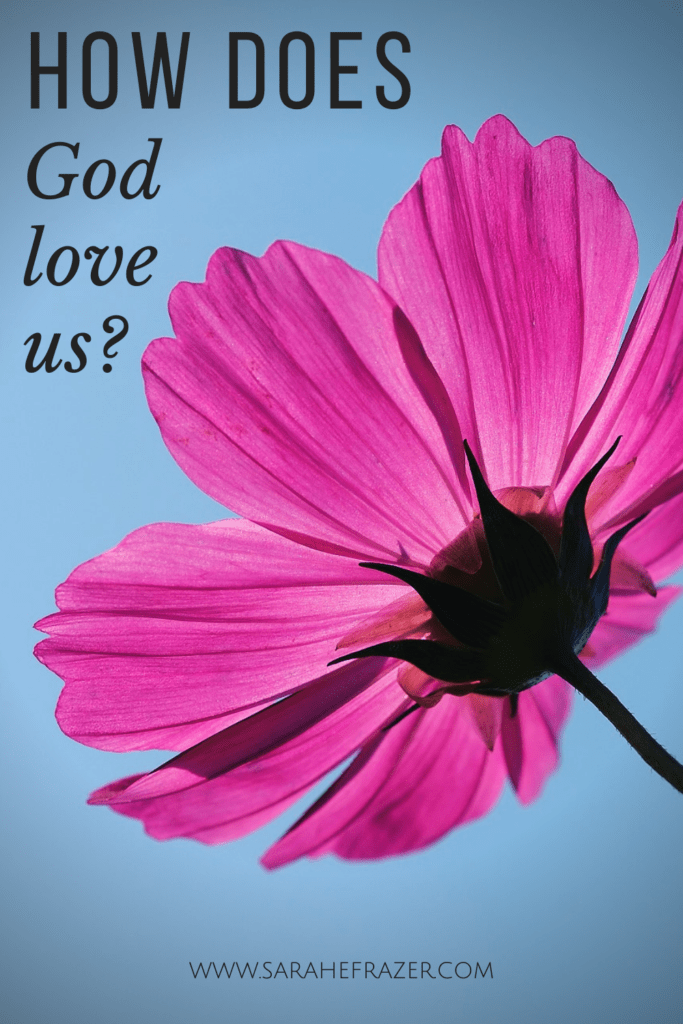How God Loves Us, Even in the Hardest Days

In the land of the goodness of God we will see His hand. You might feel as if you are living in the land of the empty, not the land of goodness. You might feel barren, lonely, or just plain hurt by life. It might be hard, but let’s take a look at a particular psalm. We can see how God loves us, even in the hardest days in Psalm 88. The author wrote this song in the middle of a very complicated, messy, and stressful situation. Heman the Ezrahite is named as the author. He was either the son of Joel and a temple musician during the time David was king (1 Chronicles 6:33) or the son of Mahol and served as a wise man during the time of King Solomon (I Kings 4:31) How might help this us see the kindness and the goodness of God in the midst of our own walk?
Because in this psalm, unlike many other psalms, the author doesn’t offer much hope on the surface. Many psalms we are used to reading always end up leading up back to hope in God, but in this particular psalm there are very little words of encouragement. There is no ending that leaves us triumphant. One of the last books written by the “sons of Korah” this psalm speaks about darkness, death, and drowning. Not a lot of uplifting words, but life doesn’t always bring us roses and sunshine.

We often don’t have to look far to find hardships, but with Heman’s song we can still God’s kindness and His goodness in the midst of any circumstance. Warren Weirsbe said: “Not all of lief’s scrips have happy endings, but that does not mean that the Lord has forsaken us.”
What truth can we gleam about God’s kindness when we look at this psalm? I think we can see four major truths about God. And when the best cure for darkness is not to look inward or outward, but to look upward. In the shadows God’s character shines and lights the darkness around us.
How God Loves Us, Even in the Hardest Days
1. God’s Hand is Still Upon Us
In the middle of the chapter we see some questions. “Do you work….is your steadfast love….are your wonders known…?” (Psalm 88:10-11) They are rhetorical questions. The answer is yes. God still works wonders and His steadfast love is there. Even though we can’t see it, His hands are working! We can trust God is working and His wonders are being shown throughout the earth.
2. God’s Ears are Still Open to Us
In the middle of the ache, the author prayed. If God doesn’t listen to our prayers, why bother? But He does and I think that is why this is such an amazing psalm. Twice the author says, “I prayed….I cried to you…” God’s ears are still open to you, friend. He hears you!
3. God’s Heart is Still for Us
Our hearts need security, and God is that safe place for us. We can cry to God in prayer like Heman and say, “I suffer….I am helpless….” The psalmist knew the enemies did not have his back, but God did. The fact that the author of this song was running to God proves God is trustworthy. God’s heart is still for us! Do you doubt it? The psalmist did, but friend you don’t have to doubt it.

When we look at God and His goodness we struggle to see it. Heman, the Ezrahite did. He doubted and questioned and in the end, maybe he didn’t get his answers. Maybe you won’t have the answers either. Even if life isn’t tied up with a nice bow, emptiness fills us, and there are no happy endings, God is still God. And He is good. If we just read Psalm 88 out of the context of the Bible we might just be scoffers. So let’s end today with the very next psalm, Psalm 89. In these verses, which make up the last words of Book 3, we find a brief history of God’s work with the children of Israel and God’s promises to King David. So let’s look at how we answer the unanswerable questions:
“I will sing of the steadfast love of the Lord, forever…You have a mighty amp; strong I your hand, high your right hand…My steadfast love I will keep for him forever and my covenant will stand firm for him.”

The words “stand firm” mean “remain faithful.” God will be faithful to you, friend. In the land of barrenness you might question his steadfast love, kindness, and goodness. Don’t. Instead, follow Psalm 89’s lead and sing of the steadfast love of God and “blessed be the LORD forever!”
